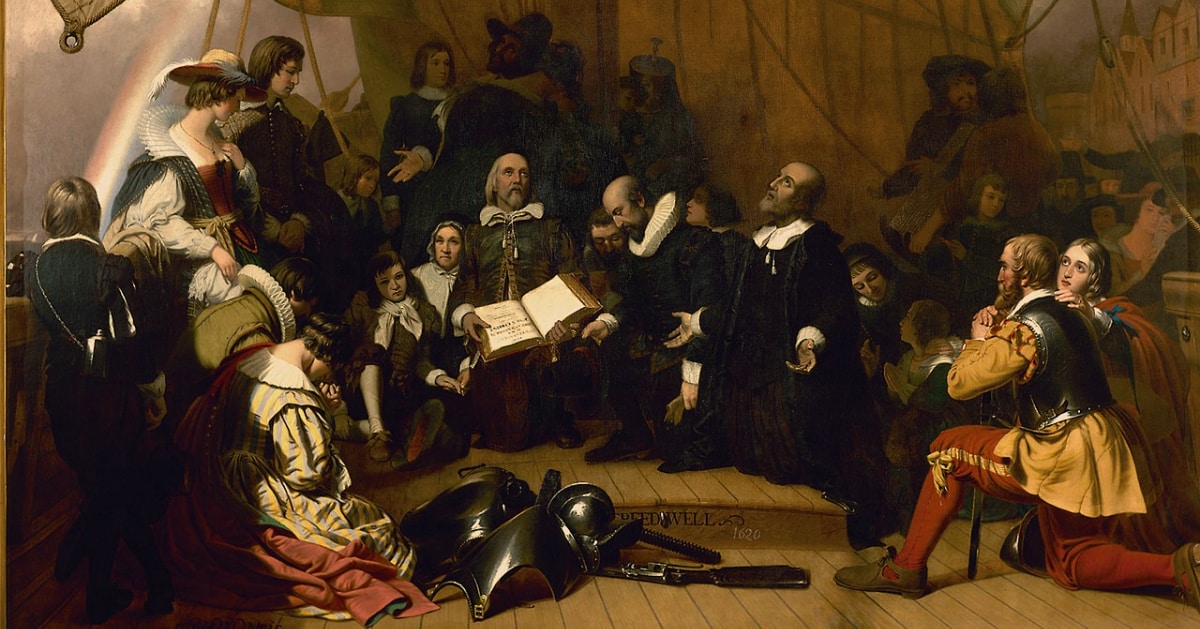“As freeborn subjects of the state of England, we hither came endowed with all and singular the privileges belonging to such, in the first place we think good that it be established … due privileges of the subject aforesaid, no imposition, law, or ordinance be made or imposed upon us by ourselves or others at present or to come but such as shall be made or imposed upon us by consent.”
Reading these lines from the so-called Pilgrim Code — written November 15, 1636 — it is easy to appreciate the influence this early constitution had on the Declaration of Independence and the Constitution of the United States of America. This undeniable influence has been forgotten, however, in an attempt to toss our true history down the memory hole, turning “history” into “social studies.”
This article will re-acquaint Americans with the story of the Pilgrim Code and the debt of gratitude we owe to our tenacious forebears.
Some 16 years after the Mayflower Compact was signed and our Pilgrim Fathers waded onto the cold and rocky shores of Massachusetts, the leaders of those settlers that survived that first freeze and famine, as well as all those who led other seekers of religious liberty to the colony known as Plymouth, gathered together to “put all the political practices and institutions, as well as the laws generated since 1620, into coherent form, eliminating what was redundant or no longer needed,” Donald Lutz writes in The Origins of American Constitutionalism.
Lutz writes that “centrality of religion” in the lives of the Pilgrim colonists, as well as their devotion to following the biblical example of a wandering people crossing the water to establish a land of promise, led the Separatists to constitute their “civil body politick” according to the covenants central to their Calvinist theology.
Whether it’s the Mayflower Compact or any of the scores of other town charters written in the first couple of decades after that seminal document was signed, each of them shared certain common clauses — covenant clauses.
According to Lutz, these covenant-inspired charters, codes, and constitutions counted on the following five “foundation elements”: first, God is called on as a witness; second, the need for the agreement is expressed; third, a covenant people is identified or created; fourth, a church is established; and fifth, the covenanting community’s goals are declared.
Such deliberations of divine provenance and purpose obviously have no place in 21st-century public schools that claim to be “educating” the descendants of these pious pioneers, and that should be unacceptable to those of us who claim to admire our ancestors and to serve the same Savior.
In addition to covenants, our Pilgrim Fathers established their communities’ constitutions on charters — the ancient expressions of English liberty. Charters, too, follow familiar patterns, Lutz explains.
Unlike covenants which united a distinct people in an agreement among themselves and their God, a charter served to create contract relationship between some earthly sovereign — the people themselves or the king — and the people agreeing to throw their lots together.
The second sentence of the Pilgrim Code is known to history as the “Plymouth Agreement,” and it is one of the earliest expressions of the once-English and always-American political tenet that the only legitimate basis for government is consent of the governed and that the Magna Carta (and other ancient, although unwritten constitutions) guaranteed that Englishmen in all places forever — including Massachusetts in 1636 — enjoyed the rights of all other Englishmen in all other places.
The Pilgrim Code declares, binding the colonists backward to Britain and forward to futurity, this dogma thus:
Now being assembled according to the said order, and having read the combination made at Cape Cod the 11th of November 1620 in the year of the reign of our late sovereign lord King James of England, France, Ireland, the eighteenth, and of Scotland the fifty-fourth, as also our letters patents confirmed by the honorable council, his said Majesty established and granted the 13th of January 1629 in the fifth year of the reign of our sovereign lord King Charles, and finding that, as freeborn subjects of the state of England, we hither came endowed with all and singular the privileges belonging to such, in the first place we think good that it be established for an act that, according to the … and due privileges of the subject aforesaid, no imposition, law, or ordinance be made or imposed upon us by ourselves or others at present or to come but such as shall be made or imposed upon us by consent, according to the free liberties of the state and kingdom of England and no otherwise.
Following the definition of this English liberty article of faith, the Pilgrim Code of Law describes the institutions and officials that the constituents will rely upon to safeguard their ancient and sacred civil liberties, including “a governor and seven assistants”; “constables”; and “other inferior officers” who would be elected by the “freemen” and would serve in those positions for “one whole year and no more.”
After the clauses creating these political offices, the Pilgrim Code laid out the oath the man chosen as governor must swear before assuming his office:
You shall swear to be truly loyal; also, according to that measure of wisdom, understanding, and discerning given unto you faithfully, equally, and indifferently, without respect of persons, to administer justice in all cases coming before you as the governor of New Plymouth. You shall, in like manner, faithfully, duly, and truly execute the laws and ordinances of the same, and shall labor to advance and further the good of the colonies and plantations within the limits thereof to the utmost of your power and oppose any thing that shall seem to hinder the same. So help you God, who is the God of truth and punisher of falsehood.
Voters, too, were required to freely swear the following oath:
You shall be loyal. You shall not speak or do, devise or advise anything or things, act or acts, directly or indirectly, by land or water, or does, shall, or may tend to the destruction or overthrow of his present plantation, colony, or corporation of New Plymouth, neither shall you suffer the same to be spoken or done, but shall hinder, oppose, and discover the same to the governor and assistants of the said colony for the time being, or some one of them. You shall faithfully submit to such good and wholesome laws and ordinances as either are or shall be made for the ordering and government of the same, and shall endeavor to advance the growth and good of the several plantations within the limits of this corporation by all due means and courses. All which you promise and swear by the name of the great God of heaven and earth, simply, truly, and faithfully to perform as you hope for help from God, who is the God of truth and punisher or falsehood.
Again, the reverence and righteousness required of governors and governed as set out in these oaths make it very clear why contemporary Americans are taught nothing of this historic document, the date it was signed, or the faith that bound our forefathers in a body of believers and firmly cemented their uncompromising commitment to liberty and to the God that made them free.
Unlike the Mayflower Compact, which was more a statement of legal limits and governmental goals of the signers, the Pilgrim Code, with its provisions creating offices, term limits, and qualifications for suffrage, was, according to Lutz, “the first modern constitution.”
The Pilgrim Code, he continues, was a constitution and covenant where a “free, self-governing people used a deliberative process based upon their consent to create a government,” a government “centered upon a representative assembly beholden to a virtuous people as measured by God’s law.”
I’ll conclude this reminder of the Pilgrim Code with the words of the oath required of “any residing within the government”:
Whereas you make choice at present to reside within the government of New Plymouth, you shall not do, or cause to be done, any act or acts, directly or indirectly, by land or water, that shall or may tend to the destruction or overthrow of the whole or any of the several colonies within the said government that are or shall be orderly erected and established, but shall, contrariwise, hinder, oppose, and discover such intents and purpose as tend thereunto to the governor for the time being, or some one of the assistants with all convenient speed. You shall also submit to and obey such good and wholesome laws, ordinances, and officers as are or shall be established within the several limits thereof. So help you God, who is the God of truth and punisher of falsehood.
May we never forget the faith of our Pilgrim Fathers and may we give thanks to them for their tenacity, their piety, and their zeal for the perpetuation of liberty in their charters, covenants, and constitutions. Let us likewise never forget our obligation to teach their inspiring and sacred story to each generation of their descendants, now and always.
This article was originally published at The New American and is reposted here with permission from the author.



